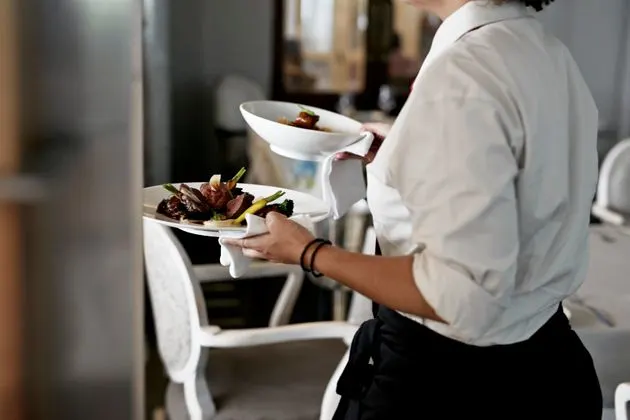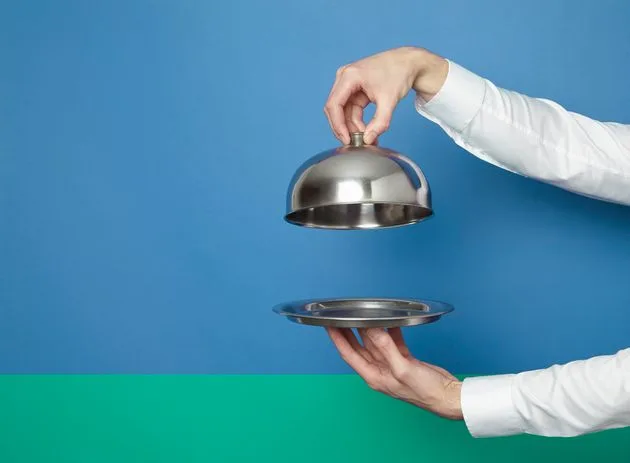When you enter a restaurant, you may notice the hospitality of the host and waitstaff, the overall atmosphere, the cuisine options, and the other diners. However, it’s not just you who is observing the surroundings. Restaurant servers are also likely assessing you and trying to gauge what kind of guest you will be.
According to Kelly Ennis, who worked as a server for about 15 years, being a server teaches you to quickly analyze people’s behavior. You can tell if a table is in a bad mood or in a rush just by approaching them. It’s all about understanding body language and establishing a rapport swiftly.
We spoke to experienced restaurant servers to find out what they have observed about their guests while dining out and why it matters for their job.
One of the things they observe is how you respond when they introduce themselves.
Are you sitting at your table, scowling at the menu with your arms crossed when your server first approaches? Or do you stop what you’re doing and actually listen to them?
Chuck Anderson, a former server with 20 years of experience, recalls encountering customers who barely acknowledged him and couldn’t even remember what he looked like. He emphasizes the importance of basic manners, such as addressing your server by their name and using “please” and “thank you.”
Darron Cardosa, a former server with 25 years of experience and the blogger behind The Bitchy Waiter, believes that customers often underestimate the impact of simple gestures like making eye contact. He believes that these gestures can greatly improve the relationship between customers and their server.
The servers also pay attention to the dynamics at your table when you first sit down. Simon K., who has served for about six years, explains that servers usually notice who you are dining with.
“The ability to differentiate between two friends hanging out or a romantic date can be determined through conversation with the guests,” he explained.
When children are present at a table, Simon assesses their behavior to gauge the level of discipline: “You need to consider how lenient the parents are in terms of keeping their child seated or allowing them to run around the restaurant, as well as the cleanliness underneath the table.”
Paying attention to these details helps servers estimate the level of attention each table will require, how to space out orders, how long the cleanup will take, and even gives an idea of the potential bill.
Another significant observation for servers is how customers treat others at their table.
“If someone shows disregard for their spouse, date, or children, it doesn’t bode well for how they will treat their server,” Cardosa stated.

Servers also notice entitlement based on the way customers place their orders.
According to Cardosa, it is generally acceptable to ask for substitutions and to split the check. However, these requests should be logical and reasonable. For instance, asking to replace a low-cost ingredient with an expensive one is unlikely to be accommodated. Cardosa explained that requesting something like, “I don’t want tomatoes, but can I have shrimp instead?” would result in an additional charge.
Similarly, splitting checks can become confusing and complicated if someone wants to divide items unevenly. Simon gave an example of someone wanting to split a bottle of wine three ways, the appetizer two ways, and the entrees four ways. These types of excessive requests can make you appear entitled or inconsiderate towards the waitstaff.
Furthermore, waitstaff can pick up on customers who have poor time management. Cardosa compared it to the saying, “Your lack of time management is not my problem.” He expressed his feelings towards people who are in a rush, indicating that it can be noticeable and affect the service provided.
During his time working in Times Square, he encountered frequent customers who would come in and express their urgency to get to a show.
“You were aware that the show starts at 8 o’clock. It is not my responsibility to prioritize your food over others just because you arrived at 7:15,” he stated.
Another example of poor time management is when customers arrive at a restaurant just a few minutes before closing, despite being aware of the impending closure.
“The last thing you want is to have a last-minute table that orders multiple items and then stays for two hours,” Simon explained. “Working at a restaurant is incredibly exhausting, and people want to go home.”
Under no circumstances should you attempt to get their attention by snapping your fingers.
Furthermore, it is impossible for them to judge how you will treat them based on your appearance.
Servers at restaurants have revealed that you can never judge a customer by their appearance. Whether they are dressed in a fancy suit or a casual T-shirt and shorts, it’s impossible to predict how they will treat the waitstaff, how much they will spend, or how much they will tip.
One server shared a story about a regular customer who initially seemed grumpy but turned out to be one of the best tippers.
The most important thing for servers is how customers treat them. If you ignore your server or speak to them rudely, they will feel disrespected.
Servers want customers to remember that they are professionals, not servants. They rely on their job for their livelihood, so showing a little kindness and understanding can make the dining experience better for both parties.
